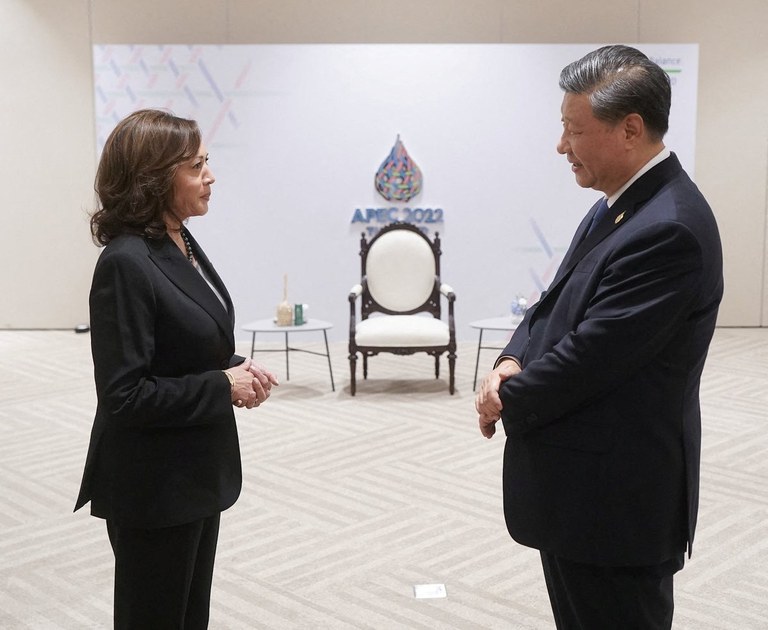
Chinese coast guard ship chased out of Vietnam waters
A Chinese coast guard ship and a Vietnamese fisheries patrol boat apparently had a tense encounter during the weekend in the South China Sea, coming as close as 10 meters to each other, according to data from Marine Traffic, a ship-tracking website. The data, based on the ships’ automatic identification system (AIS) signals, shows that the China Coast Guard ship, CCG5205, and Vietnam’s Kiem Ngu 278 came “crazy close” to one another at around 7 a.m. on Sunday local time (midnight UTC), said a researcher based in California. As of Monday afternoon (local time), the CCG5205 was operating in Malaysia’s exclusive economic zone after it left Vietnam waters where the Kiem Ngu 278 had been pursuing the considerably larger Chinese ship since March 24, tracking data showed. At one point the two ships were less than 10 meters (32.8 feet) apart, according to Ray Powell, the Project Myoushu (South China Sea) lead at Stanford University, who first spotted the incident at sea. “The Vietnamese ship was pretty bold given the difference in size – the Chinese ship is twice the size of the Vietnamese ship,” Powell said. “It must have been a very tense engagement.” The incident occurred some 50 nautical miles (92.6 kilometers) south of Vanguard Bank, a known South China Sea flashpoint between Vietnam and China. About 90 minutes later, the Chinese ship left Vietnam’s exclusive economic zone (EEZ) where it had been since Friday evening. An EEZ gives a state exclusive access to the natural resources in the waters and in the seabed. Ship-tracking data shows Vietnam’s Kiem Ngu 278 was closely following the Chinese coast guard vessel CCG5205. [Marine Traffic] Last month, the same China Coast Guard ship was accused of approaching about 150 yards (137 meters) from a Philippine Coast Guard ship and pointing a laser at the crew, causing temporary blindness to them. On Feb. 6, the Philippine Coast Guard said that the Chinese ship had “directed a military-grade laser light” twice at the BRP Malapascua, which was on its way to deliver food and supplies to the troops stationed at the Second Thomas Shoal in the South China Sea. Manila lodged a diplomatic protest and the U.S. State Department issued a statement supporting “our Philippine allies.” Beijing rejected the allegation, saying the Philippine ship had “intruded into the waters” off the Spratly Islands “without Chinese permission” and the Chinese coast guard ship had “acted in a professional and restrained way.” ‘Too close for comfort’ In the Sunday encounter, Marine Traffic’s past track showed the Chinese CCG5205 and the Vietnamese Kiem Ngu 278 were so close that they could have collided. “Ten meters between ships is really too close for comfort,” said Collin Koh, a Singapore-based regional maritime analyst. “Depending on the sea state, the risk of collision is fairly high,” Koh told Radio Free Asia (RFA). A retired Vietnamese Navy senior officer, who spoke to RFA on condition of anonymity because of the sensitivity of the topic, said the two ships must have narrowly escaped a collision because they were sailing in opposite directions and at a very slow speed. “If they were heading to the same direction a collision would have not been avoidable as the distance is too close and too dangerous,” he said. Chinese ships had deliberately rammed Vietnamese patrol ships in the past, he added, but not in recent years. The CCG5205 left Sanya, in Hainan island, for the current mission on March 11 and entered Vietnam’s EEZ the first time on March 12. It then moved to the overlapping area between claimant states in the South China Sea and Malaysia’s EEZ before entering Vietnam’s EEZ again on March 21 for a couple hours and for the third time on March 24 when the Kiem Ngu 278 chased it. At around midnight UTC on March 26, Vietnam’s Kiem Ngu 278 and China’s CCG5205 were dangerously close. [Marine Traffic] The Kiem Ngu 278, officially named Vietnamese Fisheries Resources Surveillance ship KN-278, is homeported in Vung Tau, south of Ho Chi Minh City. It left base on March 13 and had been following the Chinese vessel closely since. In July 2021, the Kiem Ngu 278 was following another Chinese coast guard ship, the CCG5202, which Vietnam accused of harassing its gas-exploration activities. Six parties hold claims to parts of the South China Sea and its natural resources but China’s claim is the biggest and Beijing has been trying to hinder other countries’ oil and gas activities in the waters inside its self-claimed nine-dash line. A 2,600-ton Chinese survey vessel, the Haiyang Dizhi Si Hao, had lingered inside Vietnam’s EEZ from March 9 until March 25, when it switched off its AIS, according to data from Marine Traffic. Its whereabouts are currently unknown.









